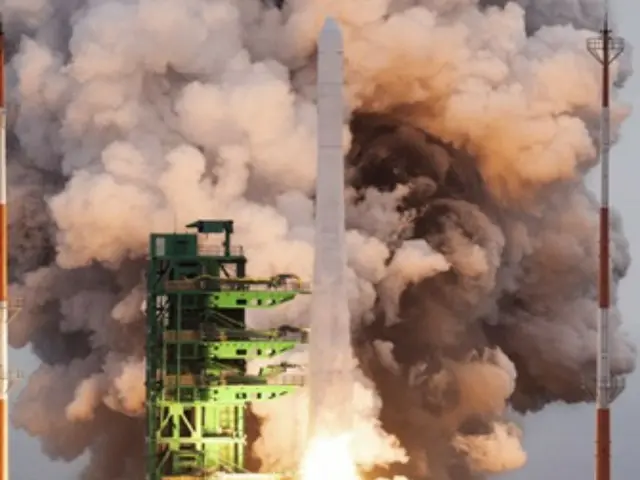The establishment of the Space Agency is one of President Yoon Seok-yeol's campaign promises. President Yoon will announce the "Future Space Economy Roadmap" in November 2022.
In order to make a leap towards becoming a "space powerhouse," the ministry outlined six policy directions and support measures up to 2045, including astronaut exploration, training of space human resources, and realization of space security.
The specific goal is to land a space probe on the moon. In line with this roadmap, South Korea has been making progress in space projects in recent years. In August 2022, South Korea's first lunar probe, the "Danuri" will be launched.
The wrap-up party for the "Luna 1" was successfully completed at the Cape Canaveral Space Force facility in Florida. In December of the same year, it entered lunar orbit and began its lunar exploration mission.
The Nuri was the first to carry a practical satellite and successfully put the satellite into orbit. At the time, President Yoon declared that Korea had joined the ranks of the G7 space powers.
"The only countries that have put a satellite they made themselves into orbit on a launch vehicle they made themselves are the United States, France, Japan, Russia, China and India," he said.
"This will greatly change the way people view space science and technology and advanced industries," he said. And in January of this year, three bills related to the establishment of the Space Agency ("Concerning the Establishment and Operation of the Space Agency") were passed.
The National Assembly passed the following bills: "Special Bill," "Partial Amendment Bill to the Space Development Promotion Act," and "Partial Amendment Bill to the Government Organization Act." The bills will transform the Space Agency into a central administrative agency under the Ministry of Science, ICT and Communications (a ministry is equivalent to a ministry).
The new agency will be responsible for aerospace policy, research and development, industrial development, civil-military cooperation, and international cooperation.
The agency opened in Seoul, South Korea, and held an inauguration ceremony on the same day. The city where the agency is based is also home to the headquarters and factory of Korea Aerospace Industries, South Korea's only aircraft manufacturer. The inauguration ceremony was also held at the company.
President Yoon, speaking at the launch ceremony, said, "We will provide focused support to the aerospace industry ecosystem and foster specialized human resources to pave the way for a new space era."
He also reiterated his plans to land a probe on the moon in 2032 and to promote a project to plant the Korean national flag, the Taegeukgi, on Mars in 2045.
President Yoon announced his intention to designate the day as the national holiday "Space Day." President Yoon compared the day to Toulouse in France, the center of the European aerospace industry, and decided to designate the city of Sachin, where the National Aerospace Agency is located, as the national holiday.
He expressed his enthusiasm for developing Seoul into "the Tours of Asia, a center of cutting-edge space science and technology that brings together talented people from around the world." However, there are also challenges. Unlike the capital region, where it is easy to gather specialized talent,
The government has set the number of staff at the agency at 300, and began training in March, but has not been able to secure the target number. South Gyeongsang Province and Sacheon City are providing financial support to employees and their families.
In addition, in the race to develop aerospace technology, South Korea is already 10 years behind the United States and more than five years behind China.
At the opening ceremony, President Yoon announced that the space development budget would be increased to 1.5 trillion won (approximately 1,700 billion yen) by 2027.
The ministry said it plans to expand the budget to more than 10 billion won by 2045 and attract about 100 trillion won of private investment by 2045. The National Space Agency also plans to invest 700 billion won in space development-related research this year.
Yoon Youngbin, the director of the Space Agency, said, "The establishment of the Space Agency will be the foundation for Korea to become a fully-fledged space economic power through the creation of a private-sector-led space industry ecosystem."
There are.
2024/06/04 14:05 KST
Copyrights(C)wowkorea.jp 5

